
- U.S. oil gained 1% for the week and 5.9% for June.
- Oil prices are rising as signs point toward a military conflict between Israel and Hezbollah, stoking fears of a confrontation with OPEC member Iran.
- The Pentagon has moved military assets closer to Lebanon to prepare for the evacuation of Americans, defense officials told NBC News.
U.S. crude oil on Friday booked a third straight weekly gain as fears of war between Israel and the Iran-backed militia Hezbollah grow.
West Texas Intermediate briefly hit an intraday high of $82.72 per barrel, the highest level for the U.S. benchmark since April 30. Brent rose to $87.22 per barrel earlier in the session, the global benchmark's highest level in two months.
U.S. oil gained 1% for the week and 5.9% for June.
Get Philly local news, weather forecasts, sports and entertainment stories to your inbox. Sign up for NBC Philadelphia newsletters.
Here are Friday's closing energy prices:
- West Texas Intermediate August contract: $81.54 per barrel, down 20 cents, or 0.24%. Year to date, U.S. oil has gained 13.8%.
- Brent August contract: $86.41 per barrel, up 2 cents. Year to date, the global benchmark is ahead by 12.1%.
- RBOB Gasoline July contract: $2.52 per gallon, down 0.65%. Year to date, gasoline has gained 20.2%.
- Natural Gas August contract: $2.60 per thousand cubic feet, down 3.13%. Year to date, gas is ahead by 3.4%.
Oil prices are rising as signs point toward a military conflict between Israel and Hezbollah, stoking fears of a confrontation with OPEC member Iran that could disrupt crude supplies, according to RBC Capital Markets.
Money Report
The Pentagon has moved military assets closer to Lebanon to prepare for the evacuation of Americans as fighting escalates and as cross-border fire between Israel and Hezbollah intensifies, three U.S. defense officials told NBC News. The State Department urged U.S. citizens Thursday to strongly reconsider travel to Lebanon.
Hezbollah could target Israel's offshore gas operations if war breaks out, and Israel could seek to hit Iranian oil facilities, according to RBC Capital Markets. There is also a risk that Iran could attack tankers in the straight of Hormuz or abandon a détente with Saudi Arabia and hit the kingdom's oil facilities, according to the firm.
Even if the Iran-Saudi détente holds, "we still would not rule out a risk to regional energy supplies and other important economic assets if the war spreads beyond the current borders," Helima Croft, global head of commodity strategy at RBC, and her team of analysts wrote in a Thursday note to clients.






